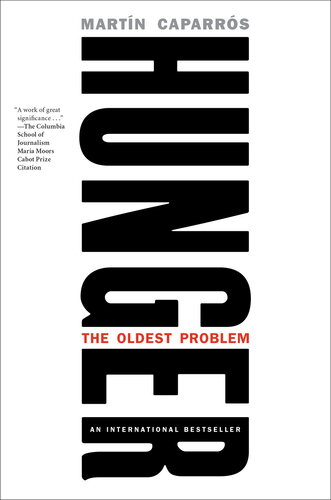
Hunger
The Oldest Problem
- اطلاعات
- نقد و بررسی
- دیدگاه کاربران
نقد و بررسی

October 14, 2019
Global hunger is the great moral issue of our time, argues this vehement but unfocused jeremiad. Argentine journalist and novelist Caparrós (El Hambre) profiles a woman in arid Niger who dreams of owning a cow; a mother working in a Bangladesh factory; scavengers picking through garbage in Buenos Aires; homeless Chicagoans at food pantries; and Doctors Without Borders physicians treating the ravages of malnutrition, among others. His reportage is stark and moving as people describe their struggles to survive and, heartbreakingly, the deaths of their children from starvation and disease. Caparrós’s analysis of the problem is less forceful, however. He writes perceptively of poor people made “disposable” by globalization, but his discussions of food issues like GMOs and commodity markets are confused and his statistics sometimes untrustworthy. (Life expectancy in Zambia is 63 years, according to the World Bank, not 38 years, as he suggests.) His erratic critique of international food policy denounces “the barbarity of capitalism” and satirizes Western callousness through imagined “voices of the tribe” (“I’ve got enough problems without going around thinking about those poor bastards in Africa”), but never musters a coherent agenda beyond changing the “social model” in order to end world hunger. Caparrós offers an effective polemic on the horrors of hunger, but little clear thinking on how to end it.

October 15, 2019
An award-winning Spanish novelist and journalist chronicles his travels around the world revealing our collective inability to "provide millions of people with enough food to...live healthfully." "There is no plague as lethal, and at the same time as avoidable, as hunger." So writes Caparrós (Professor-at-Large/Cornell Univ.; Valfierno: The Man Who Stole the Mona Lisa, 2008, etc.), asserting that as many as 800 million people experience life-threatening hunger every day. Sometimes this hunger is due to famine, which, he writes, can be justified, so to speak, by the fact that its cause is often war or an accident of weather; more often it can be traced to the whims of bureaucracy and "the banality of evil." Whatever the cause, by his estimate, five children die every minute around the world from hunger. Caparrós describes his travels to Argentina, Niger, India, and the U.S. to examine food insecurity, famine, agricultural inefficiencies, climate change, and the like. The author concludes that hunger is a product not of biology but of economics. In a time of great inequality, the haves owe their fortunes to the fact that there are so many have-nots, and "the capitalist machine doesn't know what to do with hundreds of millions of people" it considers to be "surplus." The capitalist critique is well considered if sometimes diffuse. The author's argument takes on greater force when he works with the data to make significant points, such as the fact that Argentina, which produces enough export crops such as soybeans and maize to feed 300 million people, still cannot manage to take care of its own precisely because its resources are flowing outward. "How is there not enough?" he asks, answering his own question by placing the Argentine example in the context of the globalized commodity system. In that context, even as Argentina has managed to replace its rural laborers with machines, "it hasn't figured out what to do with those people." Thus, they starve. A broad-ranging, provocative examination of a problem that is likely only to grow.
COPYRIGHT(2019) Kirkus Reviews, ALL RIGHTS RESERVED.

Starred review from December 1, 2019
Spanish columnist and fiction writer Caparr�s' titanic exploration of the oldest problem is nothing less than astonishing. The author's masterful blending of painfully personal interviews, sweeping geopolitical history, social observation, and biting personal commentary ( Hunger, he writes, is a deplorable word. Third-rate poets, sixth-rate politicians, and hacks of all sorts have used it so often and so casually, it should be forbidden ) coalesces into a majestic analysis of a problem long relegated to the international list of impossibles, ranking right up there with war and religion. Touching on conditions found on the ground in countries from Niger to Argentina to the U.S., Caparr�s arms himself with equal parts fury and shame as he absorbs all the ways in which the developed world lets down those it has long dismissed as trapped in cycles in despair (as if they mysteriously got there on their own). He also intricately discusses how the redrafting of borders and the curse of one-sided trade agreements have doomed millions. It is nearly impossible to believe that a book on the slow mass starvation could be in any way inspirational and yet that is what Hunger miraculously manages to do. A chronicle of righteous testimony and rage that must be read.(Reprinted with permission of Booklist, copyright 2019, American Library Association.)




دیدگاه کاربران